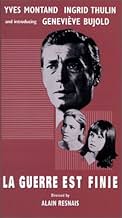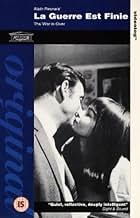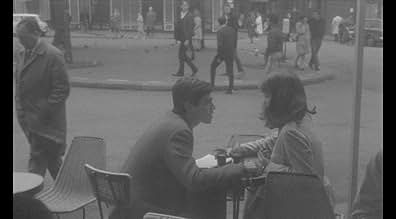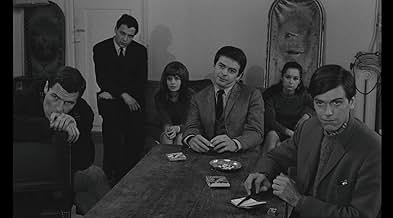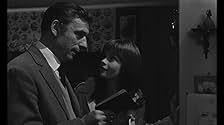CALIFICACIÓN DE IMDb
7.3/10
2.6 k
TU CALIFICACIÓN
Agrega una trama en tu idiomaA veteran Republican fighter's ardent dedication to overthrow of Franco's regime is challenged. He realizes that the center of political struggle has shifted away from him, and is forced to ... Leer todoA veteran Republican fighter's ardent dedication to overthrow of Franco's regime is challenged. He realizes that the center of political struggle has shifted away from him, and is forced to make choices about his life and political ideals.A veteran Republican fighter's ardent dedication to overthrow of Franco's regime is challenged. He realizes that the center of political struggle has shifted away from him, and is forced to make choices about his life and political ideals.
- Nominado a 1 premio Óscar
- 4 premios ganados y 4 nominaciones en total
- Dirección
- Guionista
- Todo el elenco y el equipo
- Producción, taquilla y más en IMDbPro
Opiniones destacadas
Many folks who watch this film today might be a bit confused about the context, so I'll try to explain. When the Spanish Republican army was defeated by Francisco Franco's troops at the end of the Spanish Civil War in the late 1930s, many Republicans (many of whom were communists and socialists) were jailed or killed--and many more poured over the border into exile in countries like France.
The character Yves Montand plays in this film, Diego Mora, is one of these communist exiles--one who regularly sneaks back and forth between the countries on missions for his cause. Exactly what he does on these missions is never talked about very much in these films but he and his comrades are trying to keep alive a small dissident group within Spain. However, during one of these many trips, he is taken in for questioning at the border. Somehow the police have become suspicious but with the help of a young French lady (Genevieve Bujold) he's able to extricate himself from custody. But, others in the organization weren't so lucky and were arrested. Because of this, Mora plans on returning to Spain to try to alert others in his cell so they can escape. However, instead of doing this, he spends so much of the film doing nothing in particular. In fact, that is a HUGE problem with the film. He learns about the possible leak in his organization and the arrests early on in the film and yet doesn't return to help the other agents until about 90 minutes later. In the interim, he meets with several women he cares about or wishes to have sex* with before his return to Spain. In addition, he talks and talks and talks--too much to keep the film interesting or well-paced. Overall, an interesting and well acted curio--especially since Montand himself was a communist and much of the story seems ironic in light of his own background as an Italian expatriate. But not a particularly enjoyable curio.
*Oddly, the first sex scene in the film was one of the most unintentionally funny I have ever seen. Instead of showing any real skin, the camera kept showing everything BUT--and with all sorts of artsy angles and composition. It made me laugh and seemed bizarre in light of the very ordinary and non-prudish sex scene later in the film. Why they did this, I have no idea. Perhaps the first nude scene (with Bujold) was done this way because she was uncomfortable with nudity and I'd sure love to know why they handled it in such a silly manner.
The character Yves Montand plays in this film, Diego Mora, is one of these communist exiles--one who regularly sneaks back and forth between the countries on missions for his cause. Exactly what he does on these missions is never talked about very much in these films but he and his comrades are trying to keep alive a small dissident group within Spain. However, during one of these many trips, he is taken in for questioning at the border. Somehow the police have become suspicious but with the help of a young French lady (Genevieve Bujold) he's able to extricate himself from custody. But, others in the organization weren't so lucky and were arrested. Because of this, Mora plans on returning to Spain to try to alert others in his cell so they can escape. However, instead of doing this, he spends so much of the film doing nothing in particular. In fact, that is a HUGE problem with the film. He learns about the possible leak in his organization and the arrests early on in the film and yet doesn't return to help the other agents until about 90 minutes later. In the interim, he meets with several women he cares about or wishes to have sex* with before his return to Spain. In addition, he talks and talks and talks--too much to keep the film interesting or well-paced. Overall, an interesting and well acted curio--especially since Montand himself was a communist and much of the story seems ironic in light of his own background as an Italian expatriate. But not a particularly enjoyable curio.
*Oddly, the first sex scene in the film was one of the most unintentionally funny I have ever seen. Instead of showing any real skin, the camera kept showing everything BUT--and with all sorts of artsy angles and composition. It made me laugh and seemed bizarre in light of the very ordinary and non-prudish sex scene later in the film. Why they did this, I have no idea. Perhaps the first nude scene (with Bujold) was done this way because she was uncomfortable with nudity and I'd sure love to know why they handled it in such a silly manner.
Resnais really impressed me with this film. He uses real locations and finds subtle atmospheric things that almost never turn up in movies. One sees the way a shadow of a tree moves gently back and forth on the wall as two people relax in bed, the way a gust of wind briefly animates a woman's hair in a subway tunnel.
The movie successfully combines an account of resistance to Franco's Spain from an ex-patriot living in Paris (played by Montand), and his life outside of politics. We see not only his political views, but also how he feels about love and his own situation. Beautiful, brave and innovative, this movie also has some of the most passionate, yet restrained and overall fascinating love scenes that I have seen since Peter Sellers and Shirley Maclaine in 'Being There.'
The movie successfully combines an account of resistance to Franco's Spain from an ex-patriot living in Paris (played by Montand), and his life outside of politics. We see not only his political views, but also how he feels about love and his own situation. Beautiful, brave and innovative, this movie also has some of the most passionate, yet restrained and overall fascinating love scenes that I have seen since Peter Sellers and Shirley Maclaine in 'Being There.'
Alain Resnais was part of the so-called Left Bank of the French New Wave, alongside with Varda, Marker and Demy, who were politically much more aware compared to the film fanatics of Cahiers du Cinema (Rohmer, Truffaut, Rivette, Godard, Chabrol). Alain Resnais has always been interested in past but here he focuses on its impact with regards to the future. The War Is Over was his fourth feature, following Hiroshima mon amour, Last Year in Marienbad and Muriel, and still remains as one of the finest films of political cinema. The film builds around the theme of how to come to terms with one's past in order to live in peace with the present. No other place -- maybe Germany or Poland -- offers such a great setting for this but Spain because the shadows of the Civil War are so present. It is a milieu that has become the symbol of the war, so to speak.
Diego Mora (Yves Montad) is an old man who spent his youth as a revolutionary in the Spanish Civil War. Now, thirty years later, he's part of a group that wants to redeem the dreams of the revolution in Paris. All the members of the group are living in the past, and so is Diego. But soon he has a moment of realization and breaks himself away from the chains of illusion and decides to make a change. Thus, The War Is Over is really a story about a man who is living a lie. It tells, rather bleakly in a melancholy tone, about old communists who can't let go off the past.
The War Is Over might just be Resnais' most satisfying work when it comes to somewhat coherent viewing experience. It's his first film with a clear storyline which is relatively easy to follow even if the editing was deliberately (but not self-deliberate!) ambiguous and confusing. Resnais has succeeded perfectly to relay the flow of time. Moreover, through the character played by Yves Montand the viewer can understand the director's thoughts and emotions, no matter how shattered, because he holds the pieces together. It is he through whom the viewer constructs the big picture.
In The War Is Over memories are created for the future. Alain Resnais doesn't try to build the horrors of the past by newsreel footage. He relays the tragedy of the conditions by showing how people are still living in the past, how they are left with unredeemed dreams in their hands. The dream has died in Spain. Of course, Spain is still there but merely as a concrete place full of tourists. People don't understand each other. There is a major breakdown in the communication between the old and the new left. Both are dreaming of a revolution but in their own ways. The legacy of the past torments the protagonist. However, he is not only forced to recall the past endlessly but also to be unable to understand the present reality.
Diego Mora (Yves Montad) is an old man who spent his youth as a revolutionary in the Spanish Civil War. Now, thirty years later, he's part of a group that wants to redeem the dreams of the revolution in Paris. All the members of the group are living in the past, and so is Diego. But soon he has a moment of realization and breaks himself away from the chains of illusion and decides to make a change. Thus, The War Is Over is really a story about a man who is living a lie. It tells, rather bleakly in a melancholy tone, about old communists who can't let go off the past.
The War Is Over might just be Resnais' most satisfying work when it comes to somewhat coherent viewing experience. It's his first film with a clear storyline which is relatively easy to follow even if the editing was deliberately (but not self-deliberate!) ambiguous and confusing. Resnais has succeeded perfectly to relay the flow of time. Moreover, through the character played by Yves Montand the viewer can understand the director's thoughts and emotions, no matter how shattered, because he holds the pieces together. It is he through whom the viewer constructs the big picture.
In The War Is Over memories are created for the future. Alain Resnais doesn't try to build the horrors of the past by newsreel footage. He relays the tragedy of the conditions by showing how people are still living in the past, how they are left with unredeemed dreams in their hands. The dream has died in Spain. Of course, Spain is still there but merely as a concrete place full of tourists. People don't understand each other. There is a major breakdown in the communication between the old and the new left. Both are dreaming of a revolution but in their own ways. The legacy of the past torments the protagonist. However, he is not only forced to recall the past endlessly but also to be unable to understand the present reality.
Alain Resnais was almost a god of cinema in the 60's. That people actually discussed the meaning of Last Year at Marienbad at parties seems unbelievable today (yet check the posts for Mulholland Drive), but it was a cultural object just as real as a Picasso painting. If I say that La Guerre est finie has aged badly, that's not to say that it didn't hold the attention of liberals 40 years ago.
The politics of the main (male) characters are fossilized. The old Bolshevik ideals have become more and more detached from reality. Diego knows that there will be no general strike in Spain on May 1st, no matter how hard they will it to happen. Pamphlets smuggled by car into the country in false compartments are not being translated into actions. Diego's lack of authenticity is his real problem: he's spent most of his life in France, speaks better French than Spanish, and is watching people 20 years younger than himself taking more radical steps to end Franco's rule.
Marianne has a greater grasp of reality than her lover. After nine years with Diego, she just wants to settle down and have kids, and put an end to the endless coded conversations with her friends (who are ignorant of Diego's revolutionary activities). She watches as Diego gets sloppy--driving with lights out while there's a suitcase full of plastic explosives in the car, as a cop stops them for questioning.
Semprun's script makes Montand into a sexual magnet; has any 20-year-old girl taken off her clothes faster for a tired 45-year-old man? The star system dictates that the male lead be a stud, but there are limits.
The politics of the main (male) characters are fossilized. The old Bolshevik ideals have become more and more detached from reality. Diego knows that there will be no general strike in Spain on May 1st, no matter how hard they will it to happen. Pamphlets smuggled by car into the country in false compartments are not being translated into actions. Diego's lack of authenticity is his real problem: he's spent most of his life in France, speaks better French than Spanish, and is watching people 20 years younger than himself taking more radical steps to end Franco's rule.
Marianne has a greater grasp of reality than her lover. After nine years with Diego, she just wants to settle down and have kids, and put an end to the endless coded conversations with her friends (who are ignorant of Diego's revolutionary activities). She watches as Diego gets sloppy--driving with lights out while there's a suitcase full of plastic explosives in the car, as a cop stops them for questioning.
Semprun's script makes Montand into a sexual magnet; has any 20-year-old girl taken off her clothes faster for a tired 45-year-old man? The star system dictates that the male lead be a stud, but there are limits.
This film has aged rather well considering that it's nearly 40 years old, that the concrete political situation(the Franco dictatorship in Spain)it was enmeshed in has disappeared, and that the musical score, the very mannered montage, and the sex scenes are all hopelessly dated and stilted. What gives this film its vitality is the screenplay written by Jorge Semprun, and it resonates today as well as it did in the mid-60s. Semprun had just written his classic, "The Long Voyage", in 1963, and the crisp trenchancy of his narrative style is just as evident in this film as it was in that story of his 1944 voyage to Buchenwald as a captured fighter of the French Resistance. Though we may not feel any longer the need to reassess the strategy of how to overthrow Franco, we still know what it's like to feel you're at the end of the rope with no place to leap to (both politically and psychologically). What Semprun reminds us, both in this film and in "The Long Voyage," is that it's the opportunities to experience solidarity with and support for others over the course of the journey that matters in the end.
¿Sabías que…?
- TriviaScreenwriter Jorge Semprún's life and work as a member of the central committee of the Spanish Communist party from 1954 to 1965 are the basis of the character Diego Mora played by Yves Montand actions and thoughts in 'La Guerre est finie'.
- ConexionesReferenced in What's My Line?: Yves Montand (2) (1967)
Selecciones populares
Inicia sesión para calificar y agrega a la lista de videos para obtener recomendaciones personalizadas
- How long is The War Is Over?Con tecnología de Alexa
Detalles
- Fecha de lanzamiento
- Países de origen
- Idiomas
- También se conoce como
- The War Is Over
- Locaciones de filmación
- Boulevard Saint-Germain, Paris 6, París, Francia(tailing the young man at Metro Maubert)
- Productoras
- Ver más créditos de la compañía en IMDbPro
- Tiempo de ejecución
- 2h 1min(121 min)
- Color
- Mezcla de sonido
- Relación de aspecto
- 1.66 : 1
Contribuir a esta página
Sugiere una edición o agrega el contenido que falta

